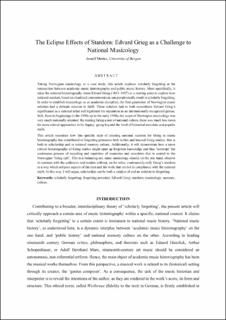| dc.description.abstract | Taking Norwegian musicology as a case study, this article explores scholarly forgetting at the intersection between academic music historiography and public music history. More specifically, it takes the national historiography about Edvard Grieg (1843–1907) as a starting point to explore how national stardom, based on ritualized commemoration, can paradoxically result in scholarly forgetting. In order to establish musicology as an academic discipline, the first generation of Norwegian music scholars had a delicate mission to fulfill. These scholars had to both consolidate Edvard Grieg’s significance as a national artist and legitimize his reputation as an internationally recognized genius. Still, from its beginnings in the 1950s up to the early 1990s, the scope of Norwegian musicology was very much nationally oriented. By making Grieg a star of national culture, there was much less room for more critical approaches to his legacy, going beyond the level of historical anecdote and popular myth. This article examines how this specific style of creating national stardom for Grieg in music historiography has contributed to forgetting processes both within and beyond Grieg studies, that is both in scholarship and in national memory culture. Additionally, it will demonstrate how a more critical historiography of Grieg studies might open up forgotten knowledge and thus interrupt the continuous process of recycling and repetition of memories and anecdotes that is central to the Norwegian “Grieg cult.” This is a balancing act, since musicology should, on the one hand, observe its contract with the audiences and readers without, on the other, continuously reifying Grieg’s stardom in a way that eclipses those aspects of the man and his work that are not in compliance with the national myth. In this way, I will argue, scholarship can be both a catalyst of and an antidote to forgetting. | en_US |
